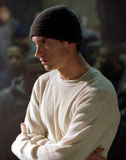
Movie Guru Rating:

Comment
on this review
| |

Eminem successfully portrays a hip-hop hero in 8 Mile
by Coury Turczyn
The story is a familiar Hollywood trope: a young man of meager means aims to bust out of his dreary town and make it big. There are the goofball sidekicks, the beautiful girlfriend with fame in her eyes, the mean boss at the factory. The odds may be against him, but with plenty of hard work, some moxie, and a lucky break, why, the sky's the limit!
Or maybe not. In real life, that lucky break may never arrive, and hard work might not result in a payoff. So at what point do you face reality and put aside your dreams? Perhaps you're not meant for greatness, or even near-greatness. Maybe you're just a normal person meant to live a normal life in the place you grew up, even if that place stinks. It could be that you'll never truly succeed.
That's the secret fear underlining the bravado of Eminem and company in 8 Mile, the world's first really good rap movie. It takes a standard teen-movie formula, sets it in the world of Detroit's aspiring rappers, and dares to introduce the idea that perhaps fame and fortune are not givens. Despite their boasting, sneering, and fighting, the rappers of 8 Mile are motivated by the specter of failure—that they may never connect, that they might have to give up. It's this dose of reality that sets 8 Mile apart from its dare-to-dream predecessors, from Fame to Krush Groove, and makes it an unexpectedly auspicious movie debut by the most respected and loathed rapper on the planet.
When it was announced some time back that Curtis Hanson—esteemed director of literary adaptations L.A. Confidential and Wonder Boys—had chosen to shoot a bio-pic with Eminem, the natural response was incredulity. Eminem? The white rapper who hates gays and lyricizes about raping and killing his own mother? Why? Hanson apparently saw a good thespian in Marshall Mathers, and he was right. Eminem, AKA Slim Shady, is an actor in his own songs. While his rage and self-righteousness are real, he often spews his lyrics in character, with the darkest humor and most inventive rhymes. Is he a homophobe? Is he misogynistic? Will he someday practice matricide? Or does he inhabit different personas to give himself license to rant like a New York performance artist? Those questions can only be answered by his psychologist. Personally, I think his lyrics reveal emotional immaturity, any number of anger-management issues, and a general desire to piss off his critics—which per-haps makes him the voice of his generation. Plus, he raps like absolutely no one else.
All these swirling contradictions could make for a fascinating film character, and Hanson gives us a good idea of how someone like Eminem can come about. Although not a bio-pic per se, 8 Mile nevertheless draws on Eminem's background to tell the story of Jimmy "Rabbit" Smith Jr., a rapper who lives with his white-trash mother (Kim Basinger) in a trailer home on 8 Mile, which is the demarcation line between Michigan's white suburbs and the decaying slums of Detroit. Shot by Rodrigo Prieto of Amores Perros fame, Detroit's inner city is cast as a perpetually gloomy landscape of abandoned buildings and rusting cars. It's just the kind of place you'd want to leave as soon as possible, and Rabbit aims to do just that through his verbal skills. Yet, he's also a realist who understands that his chances are slim, and that the "when-we-make-it" oaths of his friends could just be daydreams to avoid reality. When his biggest supporter, Future (Mekhi Phifer), enters Rabbit in some local rap battles, he chokes when faced with the sheer improbability of a white rapper competing in front of a black audience. So how can he possibly succeed?
Hanson purposely doesn't answer that question in full, letting us fill in the ending ourselves. He's more concerned with showing us the environment that creates and furthers rap. While his portrayal of the Detroit rap scene is somewhat fantastic (it's never had much support, either by audiences or radio, contrary to what's in the movie), he faithfully shows us what rap means to inner-city dreamers, wherever they may live: self-esteem, camaraderie, escape. But there's always fear, too; if your verbal skills aren't strong enough, shame and failure result. Hanson shows us the most elemental inspirations of rap, far from the gloss of multi-million-dollar MTV videos by supposed "gangstas."
But does Eminem create a character we actually care about? Yes. Although Rabbit is strikingly similar to the Eminem persona, Mr. Mathers manages to notch down his sullen, punk arrogance to the point of near-humility. His Rabbit comes across as a talented boy trying to do right, but who gets tripped up by his own impatience and short temper. It's a performance that will stand up well among the ranks of singers-turned-actors.
Whether 8 Mile will give older generations new understanding of Eminem and his popularity depends on how well they remember their own adolescent anti-heroes. There was a time when another surly, heavy-lidded teen idol was considered a danger to the nation's youth. Elvis Presley was thought to be too primal, too graphic, and just too much—like Eminem is today. (Of course, Elvis never sang about killing his wife.) Eventually, Elvis was subsumed by the corporate entertainment complex and was a threat no more—and the world lost an even greater body of work. Somehow, I doubt if success will spoil Eminem in a similar fashion, so be prepared for further outrages, and hopefully more work as mature as his performance in 8 Mile.
Coury Turczyn is the editor of PopCult Magazine.

November 14, 2002 * Vol. 12, No. 46
© 2000 Metro Pulse
|





